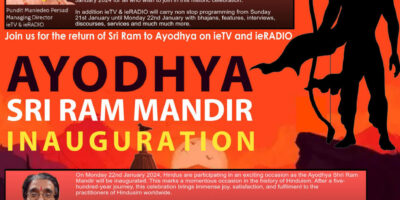Tulsidas’s birthday will be overshadowed because on the 15th of August, India celebrates its independence. At the end of this very month we in Trinidad and Tobago will also be observing the occasion marking the severing of political ties with the then colonial rulers of Europe. Let us also consider to what extent we have severed ties with India in the non-secular sphere.
The Ramcharitramanas of Tulsi is accepted by the world’s universities as a book of profound literary value. One would have expected that with this head start, Sanatan Dharma would have received the impetus to propel itself into a level of wider acceptance by world cultures. However this has not been the case because India considers itself a secular state and one of the more intoxicating agents of socialization in India – Bollywood – is executing this agenda of secularism. This trend tends to incarnate in many of the popular films and its presence is even felt in film bhajans.
In the Bhagwat Puran, there is the example that fire burns on the ground but the smoke that emanates from it is independent; in other words the fire liberates the smoke and it goes up to the sky and becomes clouds; thus, a new identity is formed. Tulsi’s Ramayan was written in India and likewise its philosophies rise to liberate mankind the world over. In Trinidad that “cloud” has being showering upon the tree of dharma through the Swaha havans. Tulsidas can be likened to the fire and the Ramcharitramanas is likened to the smoke which has risen to the heavens and has become independent of the attitudes and attributes of the original practices in India to which Tulsi was subjected.
Our ancestors, who came here, were fully cognizant of the fact that they had to practise their religion in a manner that might be diametrically opposed to the Indian experience. Thus we a have totally different way of engaging in our dharmic practices. When we go dakshina in hand to the foreign swamis for them to tell us how to pray, it is like the smoke going back to the flames. It just does not happen!
Again, Swaha has proven to be an independent organization which is guided by the Ramcharitra smoke, the Bhagwat smoke and the other Puranic smoke and so is producing indigenous publications in all areas of dharma. As the example from the Bhagwat has stated, Swaha has taken our major scriptures and exorcised the demons from the historical experiences of India, the rakshas from the cultural invasions and the range of secular intrusions and given the true independent approach to devotion as enunciated by the Vedas and reiterated by Shri Krishna in the scared Bhagwat Gita.
Tulsidas under the guide of Shivaji, wrote the Ramayan and in numerous places emphasized that the practices as obtained at that point in time in India were adharmic. He opposed the dowry system. He explained and reinforced the understandings of the caste system. He condemned the exploitation of woman. Through Sawari he exemplified the simplicity of devotion and the abhorrence for ostentatious religious endeavors. He highlighted the need to have strong and moral values in family life and above all he succeeded, with the grace of Shri Ram, to avoid anyone making the messenger out to be the message. In other words he was successful in preventing the ego from getting the better of him. His message was “Worship God, not man”.
This is the rational for not celebrating the birth of Tulsidas in any elaborate manner. The author has to be separated from his work, especially when the subject matter is God. The teachings of the Manas were geared to be applicable to all civilization and in all times. Thus it has references across the spectrum, from the utopian state as well as, an elaborate discourse on the age of Kali Yuga.
The Swaha Chaaleesa and all the other publications such as the Upaasanas and the Ratris together with the monthly newsletter are serving the purpose of propagating independence in devotion. In this month of August when we celebrate independence and also remember the contribution of Tulsidas, we must at the same time recognize that Hinduism in Trinidad is vastly different from that which obtains in India. Swaha will continue to preach Hinduism as outlined in our philosophical statement, “Enlightened Ritualism”. Let us avoid importing practices from India to our shores – practices which are predominantly non religious and thus mostly exemplify the Indian experience rather than Ram’s experience.


